The Role of Culture in the Struggle Against Colonial Domination
VerifiedAdded on 2023/04/11
|8
|1878
|351
Essay
AI Summary
This essay examines the multifaceted role of culture in the resistance against colonial domination, drawing upon social theory and historical examples. It begins by defining culture and colonial domination, emphasizing the crucial link between cultural suppression and the establishment of colonial rule. The essay then delves into the perspectives of Frantz Fanon and Edward Said, key figures in post-colonial thought, to illustrate how culture can either hinder or facilitate colonial dominance. Fanon's analysis of the psychological and social impacts of colonialism, including the role of race and the importance of decolonization, is explored. Similarly, Said's concept of Orientalism and its influence on colonial perceptions is discussed. The essay highlights how culture serves as a foundation for resistance, educating people about their past and fostering the ability to challenge colonial powers. It concludes by emphasizing that culture, with its inherent values and dynamics, is essential in any struggle against colonial domination, offering a framework for liberation and the assertion of identity.
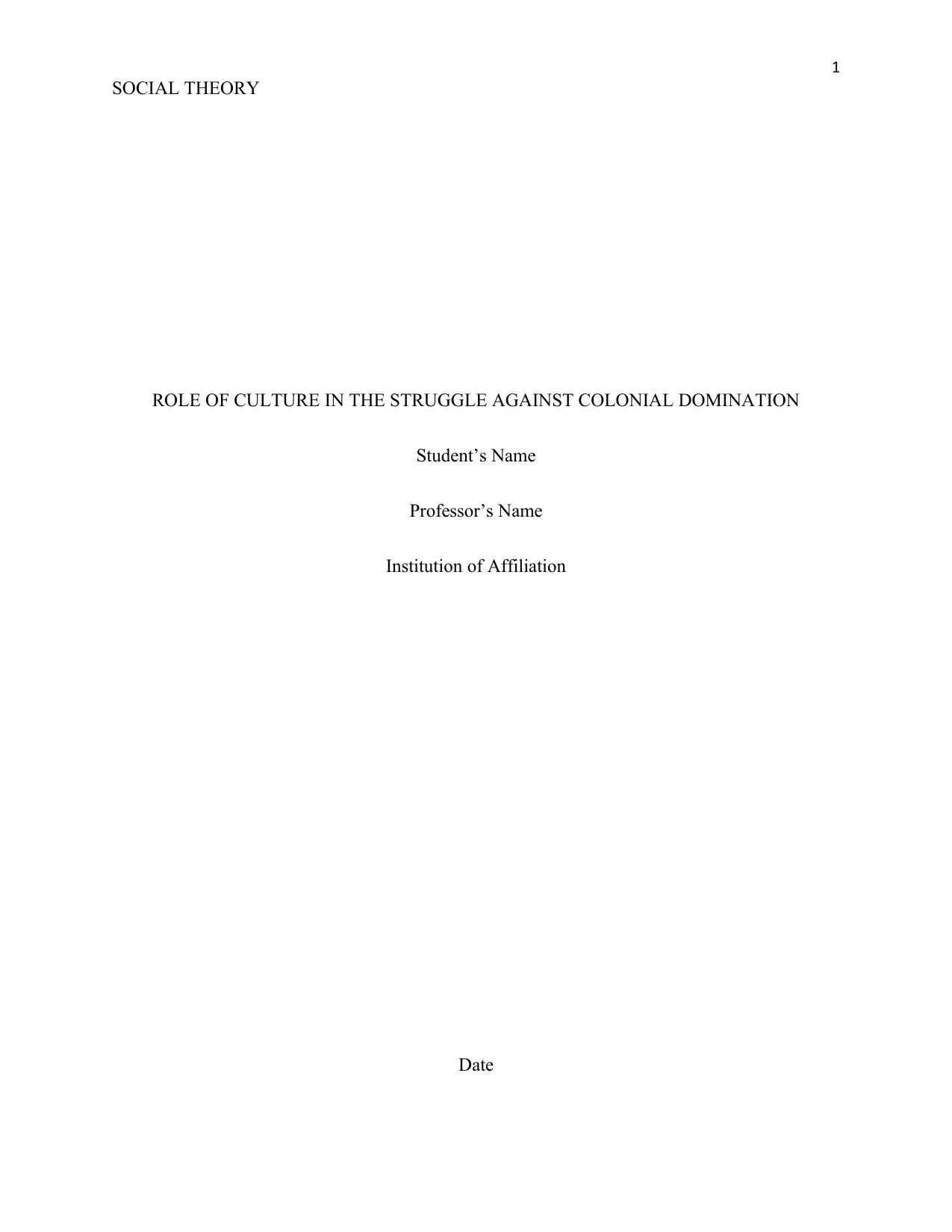
1
SOCIAL THEORY
ROLE OF CULTURE IN THE STRUGGLE AGAINST COLONIAL DOMINATION
Student’s Name
Professor’s Name
Institution of Affiliation
Date
SOCIAL THEORY
ROLE OF CULTURE IN THE STRUGGLE AGAINST COLONIAL DOMINATION
Student’s Name
Professor’s Name
Institution of Affiliation
Date
Paraphrase This Document
Need a fresh take? Get an instant paraphrase of this document with our AI Paraphraser
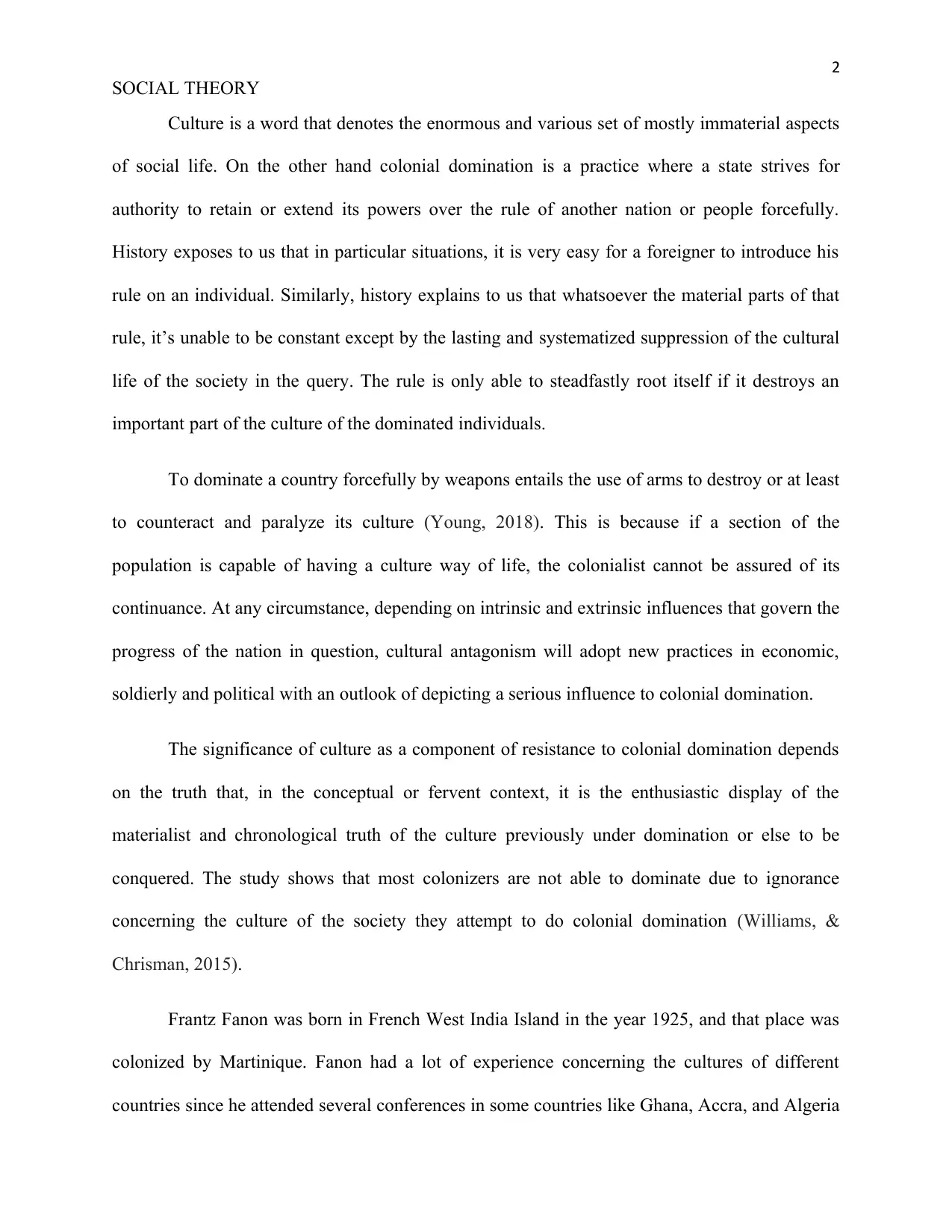
2
SOCIAL THEORY
Culture is a word that denotes the enormous and various set of mostly immaterial aspects
of social life. On the other hand colonial domination is a practice where a state strives for
authority to retain or extend its powers over the rule of another nation or people forcefully.
History exposes to us that in particular situations, it is very easy for a foreigner to introduce his
rule on an individual. Similarly, history explains to us that whatsoever the material parts of that
rule, it’s unable to be constant except by the lasting and systematized suppression of the cultural
life of the society in the query. The rule is only able to steadfastly root itself if it destroys an
important part of the culture of the dominated individuals.
To dominate a country forcefully by weapons entails the use of arms to destroy or at least
to counteract and paralyze its culture (Young, 2018). This is because if a section of the
population is capable of having a culture way of life, the colonialist cannot be assured of its
continuance. At any circumstance, depending on intrinsic and extrinsic influences that govern the
progress of the nation in question, cultural antagonism will adopt new practices in economic,
soldierly and political with an outlook of depicting a serious influence to colonial domination.
The significance of culture as a component of resistance to colonial domination depends
on the truth that, in the conceptual or fervent context, it is the enthusiastic display of the
materialist and chronological truth of the culture previously under domination or else to be
conquered. The study shows that most colonizers are not able to dominate due to ignorance
concerning the culture of the society they attempt to do colonial domination (Williams, &
Chrisman, 2015).
Frantz Fanon was born in French West India Island in the year 1925, and that place was
colonized by Martinique. Fanon had a lot of experience concerning the cultures of different
countries since he attended several conferences in some countries like Ghana, Accra, and Algeria
SOCIAL THEORY
Culture is a word that denotes the enormous and various set of mostly immaterial aspects
of social life. On the other hand colonial domination is a practice where a state strives for
authority to retain or extend its powers over the rule of another nation or people forcefully.
History exposes to us that in particular situations, it is very easy for a foreigner to introduce his
rule on an individual. Similarly, history explains to us that whatsoever the material parts of that
rule, it’s unable to be constant except by the lasting and systematized suppression of the cultural
life of the society in the query. The rule is only able to steadfastly root itself if it destroys an
important part of the culture of the dominated individuals.
To dominate a country forcefully by weapons entails the use of arms to destroy or at least
to counteract and paralyze its culture (Young, 2018). This is because if a section of the
population is capable of having a culture way of life, the colonialist cannot be assured of its
continuance. At any circumstance, depending on intrinsic and extrinsic influences that govern the
progress of the nation in question, cultural antagonism will adopt new practices in economic,
soldierly and political with an outlook of depicting a serious influence to colonial domination.
The significance of culture as a component of resistance to colonial domination depends
on the truth that, in the conceptual or fervent context, it is the enthusiastic display of the
materialist and chronological truth of the culture previously under domination or else to be
conquered. The study shows that most colonizers are not able to dominate due to ignorance
concerning the culture of the society they attempt to do colonial domination (Williams, &
Chrisman, 2015).
Frantz Fanon was born in French West India Island in the year 1925, and that place was
colonized by Martinique. Fanon had a lot of experience concerning the cultures of different
countries since he attended several conferences in some countries like Ghana, Accra, and Algeria
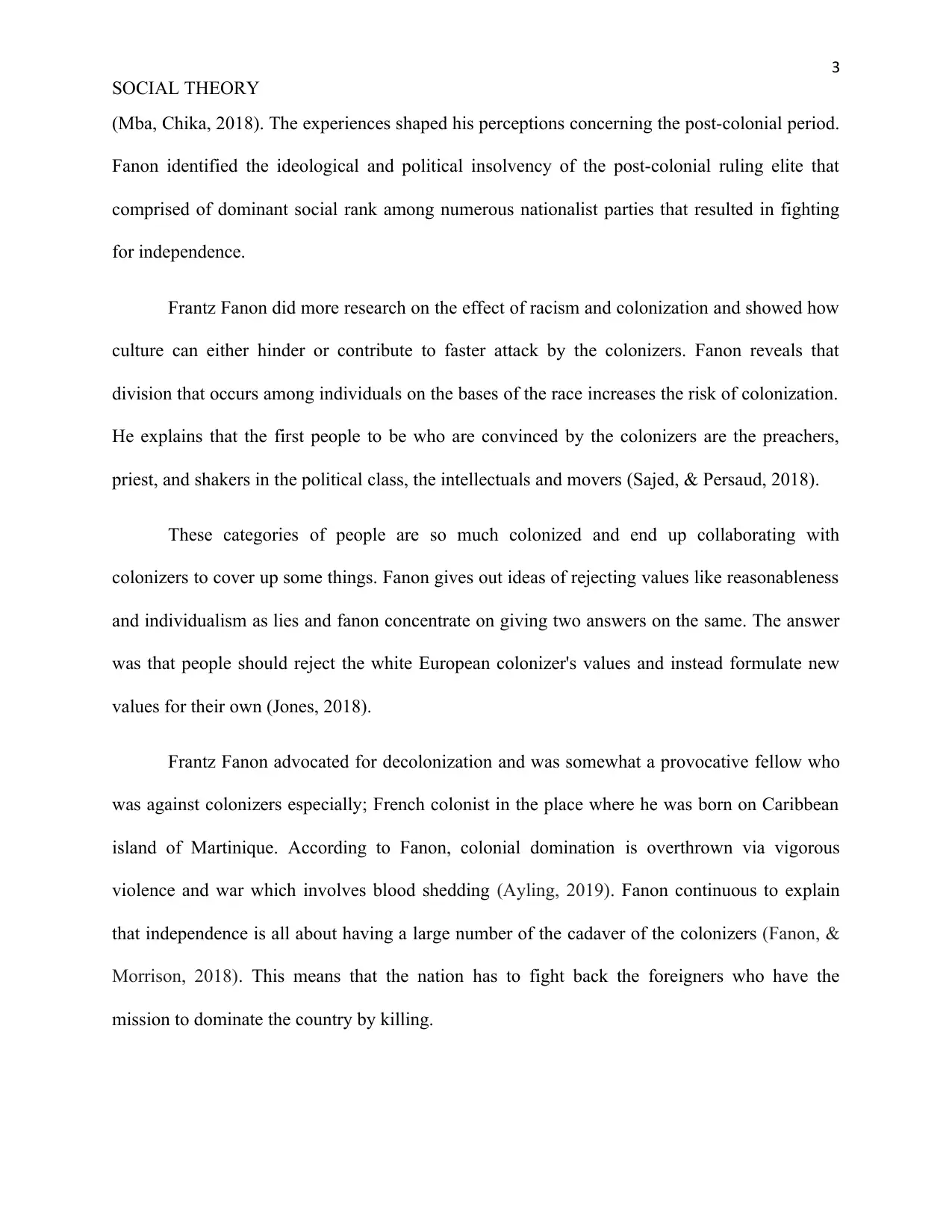
3
SOCIAL THEORY
(Mba, Chika, 2018). The experiences shaped his perceptions concerning the post-colonial period.
Fanon identified the ideological and political insolvency of the post-colonial ruling elite that
comprised of dominant social rank among numerous nationalist parties that resulted in fighting
for independence.
Frantz Fanon did more research on the effect of racism and colonization and showed how
culture can either hinder or contribute to faster attack by the colonizers. Fanon reveals that
division that occurs among individuals on the bases of the race increases the risk of colonization.
He explains that the first people to be who are convinced by the colonizers are the preachers,
priest, and shakers in the political class, the intellectuals and movers (Sajed, & Persaud, 2018).
These categories of people are so much colonized and end up collaborating with
colonizers to cover up some things. Fanon gives out ideas of rejecting values like reasonableness
and individualism as lies and fanon concentrate on giving two answers on the same. The answer
was that people should reject the white European colonizer's values and instead formulate new
values for their own (Jones, 2018).
Frantz Fanon advocated for decolonization and was somewhat a provocative fellow who
was against colonizers especially; French colonist in the place where he was born on Caribbean
island of Martinique. According to Fanon, colonial domination is overthrown via vigorous
violence and war which involves blood shedding (Ayling, 2019). Fanon continuous to explain
that independence is all about having a large number of the cadaver of the colonizers (Fanon, &
Morrison, 2018). This means that the nation has to fight back the foreigners who have the
mission to dominate the country by killing.
SOCIAL THEORY
(Mba, Chika, 2018). The experiences shaped his perceptions concerning the post-colonial period.
Fanon identified the ideological and political insolvency of the post-colonial ruling elite that
comprised of dominant social rank among numerous nationalist parties that resulted in fighting
for independence.
Frantz Fanon did more research on the effect of racism and colonization and showed how
culture can either hinder or contribute to faster attack by the colonizers. Fanon reveals that
division that occurs among individuals on the bases of the race increases the risk of colonization.
He explains that the first people to be who are convinced by the colonizers are the preachers,
priest, and shakers in the political class, the intellectuals and movers (Sajed, & Persaud, 2018).
These categories of people are so much colonized and end up collaborating with
colonizers to cover up some things. Fanon gives out ideas of rejecting values like reasonableness
and individualism as lies and fanon concentrate on giving two answers on the same. The answer
was that people should reject the white European colonizer's values and instead formulate new
values for their own (Jones, 2018).
Frantz Fanon advocated for decolonization and was somewhat a provocative fellow who
was against colonizers especially; French colonist in the place where he was born on Caribbean
island of Martinique. According to Fanon, colonial domination is overthrown via vigorous
violence and war which involves blood shedding (Ayling, 2019). Fanon continuous to explain
that independence is all about having a large number of the cadaver of the colonizers (Fanon, &
Morrison, 2018). This means that the nation has to fight back the foreigners who have the
mission to dominate the country by killing.
⊘ This is a preview!⊘
Do you want full access?
Subscribe today to unlock all pages.

Trusted by 1+ million students worldwide
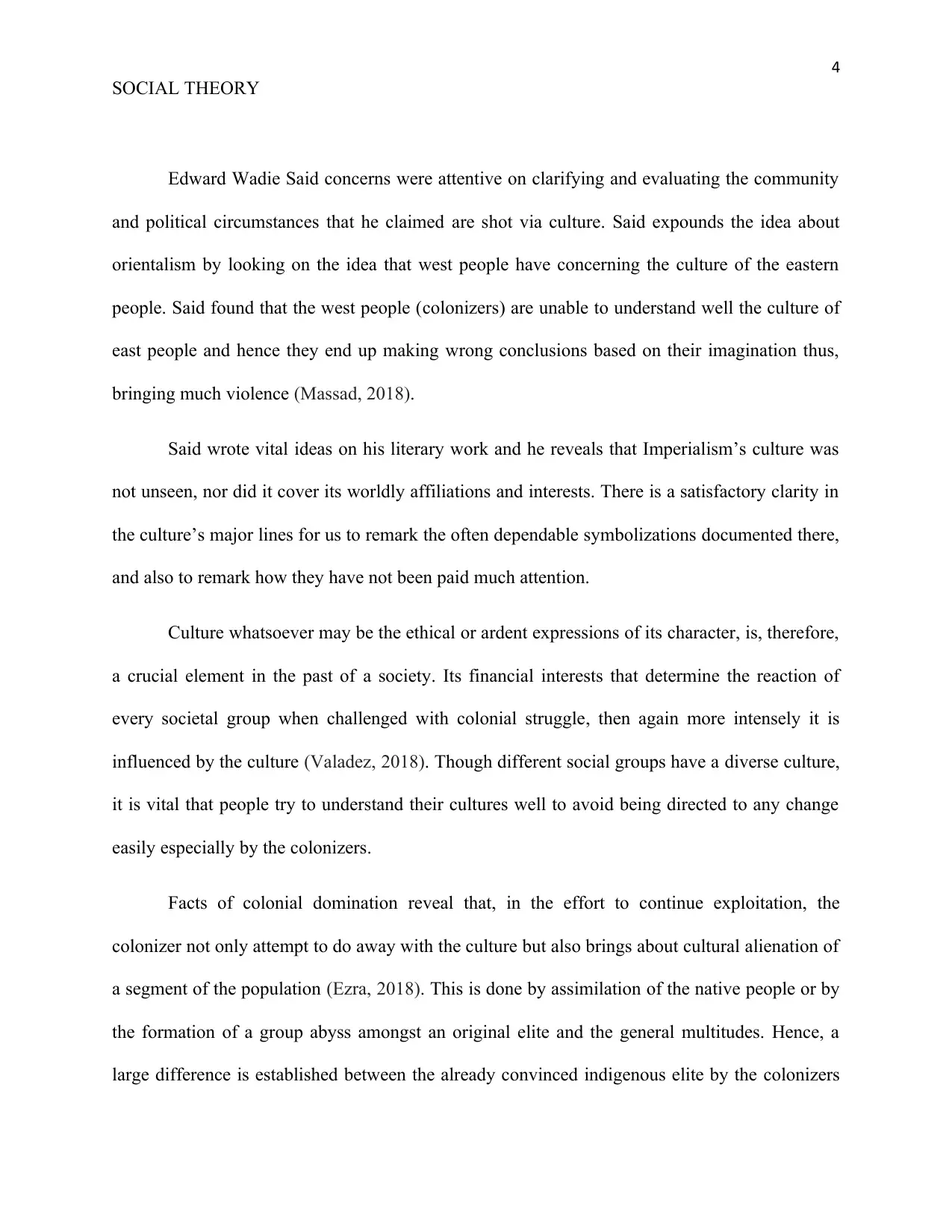
4
SOCIAL THEORY
Edward Wadie Said concerns were attentive on clarifying and evaluating the community
and political circumstances that he claimed are shot via culture. Said expounds the idea about
orientalism by looking on the idea that west people have concerning the culture of the eastern
people. Said found that the west people (colonizers) are unable to understand well the culture of
east people and hence they end up making wrong conclusions based on their imagination thus,
bringing much violence (Massad, 2018).
Said wrote vital ideas on his literary work and he reveals that Imperialism’s culture was
not unseen, nor did it cover its worldly affiliations and interests. There is a satisfactory clarity in
the culture’s major lines for us to remark the often dependable symbolizations documented there,
and also to remark how they have not been paid much attention.
Culture whatsoever may be the ethical or ardent expressions of its character, is, therefore,
a crucial element in the past of a society. Its financial interests that determine the reaction of
every societal group when challenged with colonial struggle, then again more intensely it is
influenced by the culture (Valadez, 2018). Though different social groups have a diverse culture,
it is vital that people try to understand their cultures well to avoid being directed to any change
easily especially by the colonizers.
Facts of colonial domination reveal that, in the effort to continue exploitation, the
colonizer not only attempt to do away with the culture but also brings about cultural alienation of
a segment of the population (Ezra, 2018). This is done by assimilation of the native people or by
the formation of a group abyss amongst an original elite and the general multitudes. Hence, a
large difference is established between the already convinced indigenous elite by the colonizers
SOCIAL THEORY
Edward Wadie Said concerns were attentive on clarifying and evaluating the community
and political circumstances that he claimed are shot via culture. Said expounds the idea about
orientalism by looking on the idea that west people have concerning the culture of the eastern
people. Said found that the west people (colonizers) are unable to understand well the culture of
east people and hence they end up making wrong conclusions based on their imagination thus,
bringing much violence (Massad, 2018).
Said wrote vital ideas on his literary work and he reveals that Imperialism’s culture was
not unseen, nor did it cover its worldly affiliations and interests. There is a satisfactory clarity in
the culture’s major lines for us to remark the often dependable symbolizations documented there,
and also to remark how they have not been paid much attention.
Culture whatsoever may be the ethical or ardent expressions of its character, is, therefore,
a crucial element in the past of a society. Its financial interests that determine the reaction of
every societal group when challenged with colonial struggle, then again more intensely it is
influenced by the culture (Valadez, 2018). Though different social groups have a diverse culture,
it is vital that people try to understand their cultures well to avoid being directed to any change
easily especially by the colonizers.
Facts of colonial domination reveal that, in the effort to continue exploitation, the
colonizer not only attempt to do away with the culture but also brings about cultural alienation of
a segment of the population (Ezra, 2018). This is done by assimilation of the native people or by
the formation of a group abyss amongst an original elite and the general multitudes. Hence, a
large difference is established between the already convinced indigenous elite by the colonizers
Paraphrase This Document
Need a fresh take? Get an instant paraphrase of this document with our AI Paraphraser
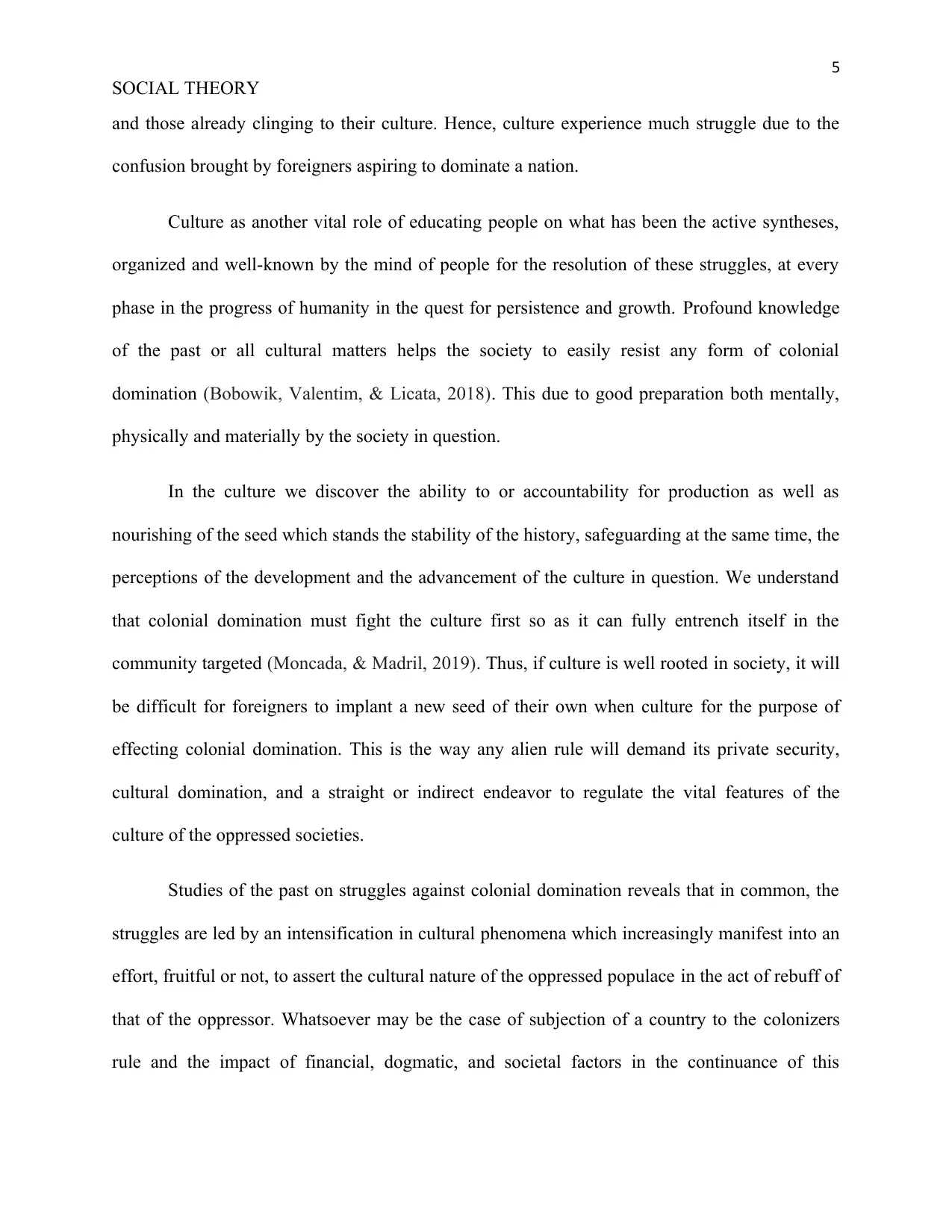
5
SOCIAL THEORY
and those already clinging to their culture. Hence, culture experience much struggle due to the
confusion brought by foreigners aspiring to dominate a nation.
Culture as another vital role of educating people on what has been the active syntheses,
organized and well-known by the mind of people for the resolution of these struggles, at every
phase in the progress of humanity in the quest for persistence and growth. Profound knowledge
of the past or all cultural matters helps the society to easily resist any form of colonial
domination (Bobowik, Valentim, & Licata, 2018). This due to good preparation both mentally,
physically and materially by the society in question.
In the culture we discover the ability to or accountability for production as well as
nourishing of the seed which stands the stability of the history, safeguarding at the same time, the
perceptions of the development and the advancement of the culture in question. We understand
that colonial domination must fight the culture first so as it can fully entrench itself in the
community targeted (Moncada, & Madril, 2019). Thus, if culture is well rooted in society, it will
be difficult for foreigners to implant a new seed of their own when culture for the purpose of
effecting colonial domination. This is the way any alien rule will demand its private security,
cultural domination, and a straight or indirect endeavor to regulate the vital features of the
culture of the oppressed societies.
Studies of the past on struggles against colonial domination reveals that in common, the
struggles are led by an intensification in cultural phenomena which increasingly manifest into an
effort, fruitful or not, to assert the cultural nature of the oppressed populace in the act of rebuff of
that of the oppressor. Whatsoever may be the case of subjection of a country to the colonizers
rule and the impact of financial, dogmatic, and societal factors in the continuance of this
SOCIAL THEORY
and those already clinging to their culture. Hence, culture experience much struggle due to the
confusion brought by foreigners aspiring to dominate a nation.
Culture as another vital role of educating people on what has been the active syntheses,
organized and well-known by the mind of people for the resolution of these struggles, at every
phase in the progress of humanity in the quest for persistence and growth. Profound knowledge
of the past or all cultural matters helps the society to easily resist any form of colonial
domination (Bobowik, Valentim, & Licata, 2018). This due to good preparation both mentally,
physically and materially by the society in question.
In the culture we discover the ability to or accountability for production as well as
nourishing of the seed which stands the stability of the history, safeguarding at the same time, the
perceptions of the development and the advancement of the culture in question. We understand
that colonial domination must fight the culture first so as it can fully entrench itself in the
community targeted (Moncada, & Madril, 2019). Thus, if culture is well rooted in society, it will
be difficult for foreigners to implant a new seed of their own when culture for the purpose of
effecting colonial domination. This is the way any alien rule will demand its private security,
cultural domination, and a straight or indirect endeavor to regulate the vital features of the
culture of the oppressed societies.
Studies of the past on struggles against colonial domination reveals that in common, the
struggles are led by an intensification in cultural phenomena which increasingly manifest into an
effort, fruitful or not, to assert the cultural nature of the oppressed populace in the act of rebuff of
that of the oppressor. Whatsoever may be the case of subjection of a country to the colonizers
rule and the impact of financial, dogmatic, and societal factors in the continuance of this
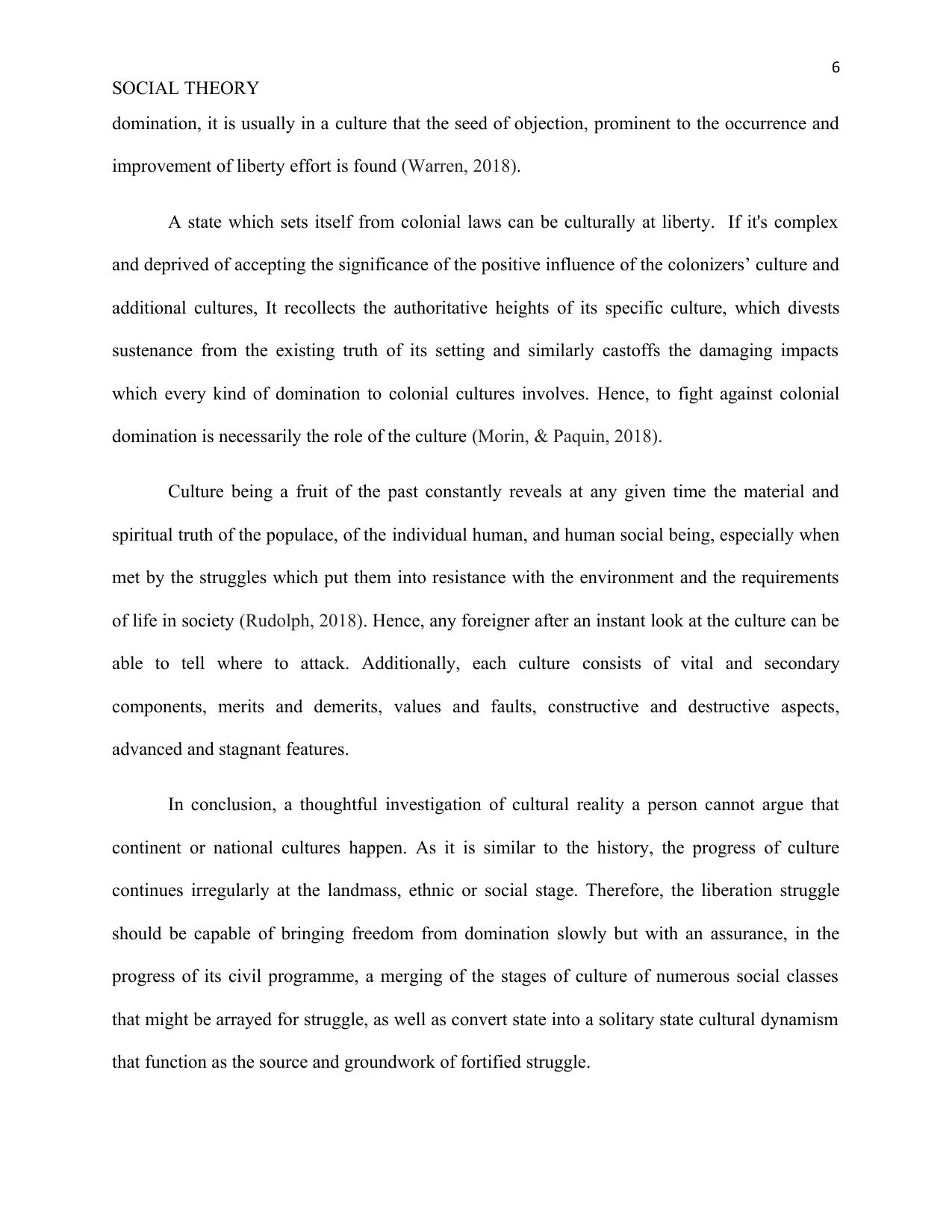
6
SOCIAL THEORY
domination, it is usually in a culture that the seed of objection, prominent to the occurrence and
improvement of liberty effort is found (Warren, 2018).
A state which sets itself from colonial laws can be culturally at liberty. If it's complex
and deprived of accepting the significance of the positive influence of the colonizers’ culture and
additional cultures, It recollects the authoritative heights of its specific culture, which divests
sustenance from the existing truth of its setting and similarly castoffs the damaging impacts
which every kind of domination to colonial cultures involves. Hence, to fight against colonial
domination is necessarily the role of the culture (Morin, & Paquin, 2018).
Culture being a fruit of the past constantly reveals at any given time the material and
spiritual truth of the populace, of the individual human, and human social being, especially when
met by the struggles which put them into resistance with the environment and the requirements
of life in society (Rudolph, 2018). Hence, any foreigner after an instant look at the culture can be
able to tell where to attack. Additionally, each culture consists of vital and secondary
components, merits and demerits, values and faults, constructive and destructive aspects,
advanced and stagnant features.
In conclusion, a thoughtful investigation of cultural reality a person cannot argue that
continent or national cultures happen. As it is similar to the history, the progress of culture
continues irregularly at the landmass, ethnic or social stage. Therefore, the liberation struggle
should be capable of bringing freedom from domination slowly but with an assurance, in the
progress of its civil programme, a merging of the stages of culture of numerous social classes
that might be arrayed for struggle, as well as convert state into a solitary state cultural dynamism
that function as the source and groundwork of fortified struggle.
SOCIAL THEORY
domination, it is usually in a culture that the seed of objection, prominent to the occurrence and
improvement of liberty effort is found (Warren, 2018).
A state which sets itself from colonial laws can be culturally at liberty. If it's complex
and deprived of accepting the significance of the positive influence of the colonizers’ culture and
additional cultures, It recollects the authoritative heights of its specific culture, which divests
sustenance from the existing truth of its setting and similarly castoffs the damaging impacts
which every kind of domination to colonial cultures involves. Hence, to fight against colonial
domination is necessarily the role of the culture (Morin, & Paquin, 2018).
Culture being a fruit of the past constantly reveals at any given time the material and
spiritual truth of the populace, of the individual human, and human social being, especially when
met by the struggles which put them into resistance with the environment and the requirements
of life in society (Rudolph, 2018). Hence, any foreigner after an instant look at the culture can be
able to tell where to attack. Additionally, each culture consists of vital and secondary
components, merits and demerits, values and faults, constructive and destructive aspects,
advanced and stagnant features.
In conclusion, a thoughtful investigation of cultural reality a person cannot argue that
continent or national cultures happen. As it is similar to the history, the progress of culture
continues irregularly at the landmass, ethnic or social stage. Therefore, the liberation struggle
should be capable of bringing freedom from domination slowly but with an assurance, in the
progress of its civil programme, a merging of the stages of culture of numerous social classes
that might be arrayed for struggle, as well as convert state into a solitary state cultural dynamism
that function as the source and groundwork of fortified struggle.
⊘ This is a preview!⊘
Do you want full access?
Subscribe today to unlock all pages.

Trusted by 1+ million students worldwide
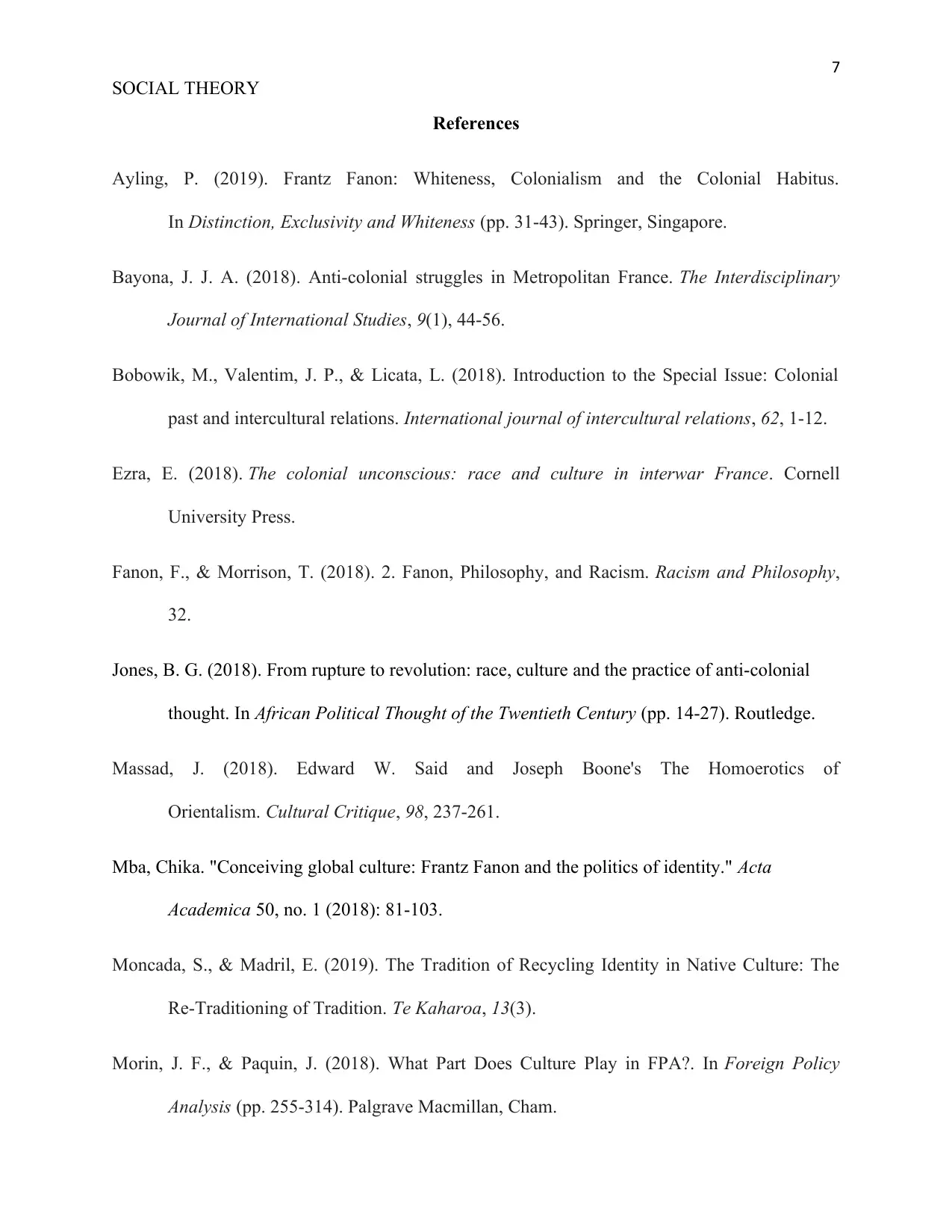
7
SOCIAL THEORY
References
Ayling, P. (2019). Frantz Fanon: Whiteness, Colonialism and the Colonial Habitus.
In Distinction, Exclusivity and Whiteness (pp. 31-43). Springer, Singapore.
Bayona, J. J. A. (2018). Anti-colonial struggles in Metropolitan France. The Interdisciplinary
Journal of International Studies, 9(1), 44-56.
Bobowik, M., Valentim, J. P., & Licata, L. (2018). Introduction to the Special Issue: Colonial
past and intercultural relations. International journal of intercultural relations, 62, 1-12.
Ezra, E. (2018). The colonial unconscious: race and culture in interwar France. Cornell
University Press.
Fanon, F., & Morrison, T. (2018). 2. Fanon, Philosophy, and Racism. Racism and Philosophy,
32.
Jones, B. G. (2018). From rupture to revolution: race, culture and the practice of anti-colonial
thought. In African Political Thought of the Twentieth Century (pp. 14-27). Routledge.
Massad, J. (2018). Edward W. Said and Joseph Boone's The Homoerotics of
Orientalism. Cultural Critique, 98, 237-261.
Mba, Chika. "Conceiving global culture: Frantz Fanon and the politics of identity." Acta
Academica 50, no. 1 (2018): 81-103.
Moncada, S., & Madril, E. (2019). The Tradition of Recycling Identity in Native Culture: The
Re-Traditioning of Tradition. Te Kaharoa, 13(3).
Morin, J. F., & Paquin, J. (2018). What Part Does Culture Play in FPA?. In Foreign Policy
Analysis (pp. 255-314). Palgrave Macmillan, Cham.
SOCIAL THEORY
References
Ayling, P. (2019). Frantz Fanon: Whiteness, Colonialism and the Colonial Habitus.
In Distinction, Exclusivity and Whiteness (pp. 31-43). Springer, Singapore.
Bayona, J. J. A. (2018). Anti-colonial struggles in Metropolitan France. The Interdisciplinary
Journal of International Studies, 9(1), 44-56.
Bobowik, M., Valentim, J. P., & Licata, L. (2018). Introduction to the Special Issue: Colonial
past and intercultural relations. International journal of intercultural relations, 62, 1-12.
Ezra, E. (2018). The colonial unconscious: race and culture in interwar France. Cornell
University Press.
Fanon, F., & Morrison, T. (2018). 2. Fanon, Philosophy, and Racism. Racism and Philosophy,
32.
Jones, B. G. (2018). From rupture to revolution: race, culture and the practice of anti-colonial
thought. In African Political Thought of the Twentieth Century (pp. 14-27). Routledge.
Massad, J. (2018). Edward W. Said and Joseph Boone's The Homoerotics of
Orientalism. Cultural Critique, 98, 237-261.
Mba, Chika. "Conceiving global culture: Frantz Fanon and the politics of identity." Acta
Academica 50, no. 1 (2018): 81-103.
Moncada, S., & Madril, E. (2019). The Tradition of Recycling Identity in Native Culture: The
Re-Traditioning of Tradition. Te Kaharoa, 13(3).
Morin, J. F., & Paquin, J. (2018). What Part Does Culture Play in FPA?. In Foreign Policy
Analysis (pp. 255-314). Palgrave Macmillan, Cham.
Paraphrase This Document
Need a fresh take? Get an instant paraphrase of this document with our AI Paraphraser
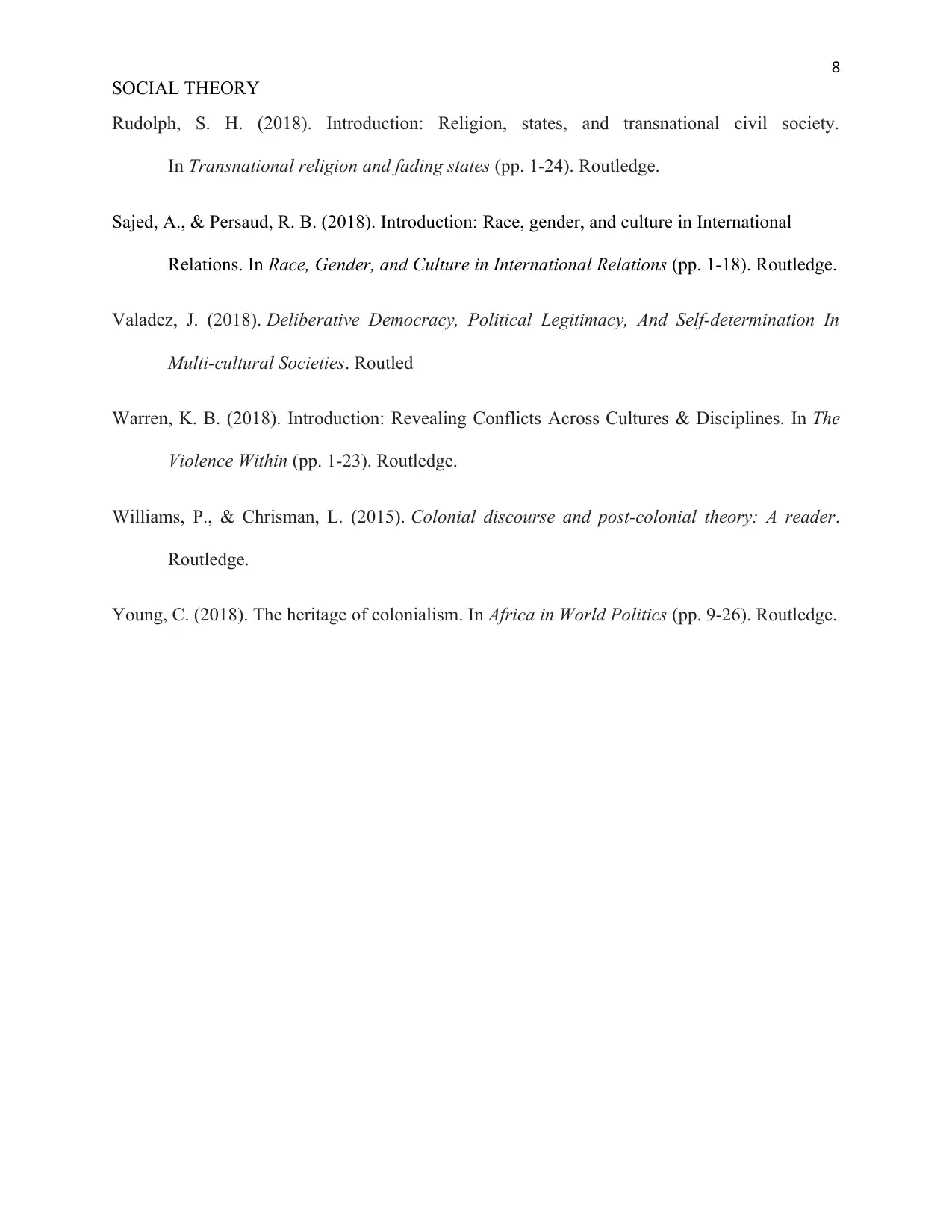
8
SOCIAL THEORY
Rudolph, S. H. (2018). Introduction: Religion, states, and transnational civil society.
In Transnational religion and fading states (pp. 1-24). Routledge.
Sajed, A., & Persaud, R. B. (2018). Introduction: Race, gender, and culture in International
Relations. In Race, Gender, and Culture in International Relations (pp. 1-18). Routledge.
Valadez, J. (2018). Deliberative Democracy, Political Legitimacy, And Self-determination In
Multi-cultural Societies. Routled
Warren, K. B. (2018). Introduction: Revealing Conflicts Across Cultures & Disciplines. In The
Violence Within (pp. 1-23). Routledge.
Williams, P., & Chrisman, L. (2015). Colonial discourse and post-colonial theory: A reader.
Routledge.
Young, C. (2018). The heritage of colonialism. In Africa in World Politics (pp. 9-26). Routledge.
SOCIAL THEORY
Rudolph, S. H. (2018). Introduction: Religion, states, and transnational civil society.
In Transnational religion and fading states (pp. 1-24). Routledge.
Sajed, A., & Persaud, R. B. (2018). Introduction: Race, gender, and culture in International
Relations. In Race, Gender, and Culture in International Relations (pp. 1-18). Routledge.
Valadez, J. (2018). Deliberative Democracy, Political Legitimacy, And Self-determination In
Multi-cultural Societies. Routled
Warren, K. B. (2018). Introduction: Revealing Conflicts Across Cultures & Disciplines. In The
Violence Within (pp. 1-23). Routledge.
Williams, P., & Chrisman, L. (2015). Colonial discourse and post-colonial theory: A reader.
Routledge.
Young, C. (2018). The heritage of colonialism. In Africa in World Politics (pp. 9-26). Routledge.
1 out of 8
Related Documents
Your All-in-One AI-Powered Toolkit for Academic Success.
+13062052269
info@desklib.com
Available 24*7 on WhatsApp / Email
![[object Object]](/_next/static/media/star-bottom.7253800d.svg)
Unlock your academic potential
Copyright © 2020–2026 A2Z Services. All Rights Reserved. Developed and managed by ZUCOL.





